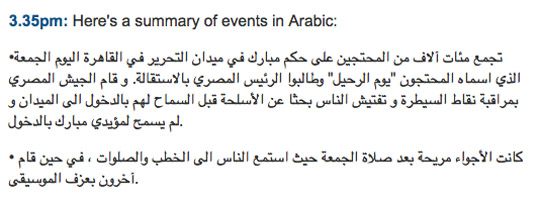Liveblogging platform ScribbleLive claims to have come up with four different ways that news organisations can make money from liveblogging, a form of reporting described by Matt Wells, blogs editor of the Guardian, as “native to the internet” and an area he would “throw resources at the expense of writing another 300 word article”.
“It is interesting how incredibly sticky the liveblog audience is, particularly for true liveblogs that are updated minute by minute,” Mark Walker from ScribbleLive told Journalism.co.uk.
What is appealing to advertisers, Walker explained, is that “there is a significant audience that just stays on the page for half an hour or more”.
Here are four ideas put forward by ScribbleLive, which offers the technology to implement the various options within a standard licence to its liveblogging platform.
1. Rotating ads
Liveblogging should be “something you monetise more like television than print”, Walker told Journalism.co.uk, suggesting that sites trial rotating ads.
Walker would not divulge his clients’ names but said a number had been very successful in adopting this approach, using technology which allows ads to rotate at a rate of one per minute.
They are able to generate $16 page CPMs, so every time a page is displayed they are making about $16 per 1,000 [viewers], that’s simply because people are staying for a long time, some for half an hour or more.
He suggested that liveblogs provide web content at a relatively low cost.
There is no incremental cost to creating the content as the journalist will be at the trial, at the election, at the event.
2. Sponsored events
The most profitable way to monetise liveblogs is though sponsorship, according to Walker.
It is impossible to pre-sell sponsorship advertising for many breaking news stories such as an earthquake, Walker pointed out, but sponsorship for some major news stories can be pre-planned. The Royal Wedding was one example, severe weather is another – and perhaps the most interesting.
Walker said severe weather liveblogs in the US and Canada have pre-sold sponsorship where a company selling snow tyres, for example, becomes the brand that brings you the liveblog on the school closures, traffic delays and general disruption.
One thing you can tell an advertiser is when we have severe weather this is how we are going to cover it. We will put your brand all over it and we will own the eyeballs of the public who will be coming to our site, in some cases, for hours at a time.
Walker also suggested another example of potential for sponsorship is a liveblog on key financial updates, with the spending review springing to mind.
He also urged media organisations, particularly the more traditional print media, to consider monetising liveblogs covering reality television and sports.
3. Live advertorial
Here is one option that will be more appealing to advertising sales people than to journalists: the liveblog of an advertorial.
Walker, speaking from his base in Canada, suggested a company within the private medical care field would be an obvious (though more US than UK) potential advertiser, with a liveblog involving a discussion with doctors. He also put forward an idea holding a debate around new green technologies to promote an area of the solar energy business.
The conversation is being influenced by the advertisers and you can make it clear it is brought to you by the brand and that the liveblog is useful to readers.
4. Embedded liveblogs within ads
ScribbleLive has come up with a second liveblogging advertorial option, this time within an advert itself.
The conversation is distributed across the site but you can drive [your audience] to a page within the property or to a page on the sponsor’s site.
You can charge a premium as it is a very engaging type of ad. And the conversation might not be driven by the brand at all. You could say we are talking to a celebrity but it’s sponsored by a brand.
In considering all of the above options it is worth remembering which liveblogs get the most traffic.
The biggest events that ever go through the ScribbleLive network, the things that tend to skew it, are major national disasters and breaking news, but they are nowhere close as far as peaks in users as Apple events and Google events when we see spikes in many hundreds of thousands in matters of seconds. That really shows the value of liveblogs.
For more on liveblogging, including examples from the Guardian, the Manchester Evening News and a hyperlocal, see: How to: liveblog – lessons from news sites
Related content:
Manchester Evening News wins innovation award for police data project
MEN extends liveblogging of council meetings after successful trial
Al Jazeera still battling interference in Egypt after internet blackout lifted
Northampton Chronicle & Echo to open up newsroom with liveblog
